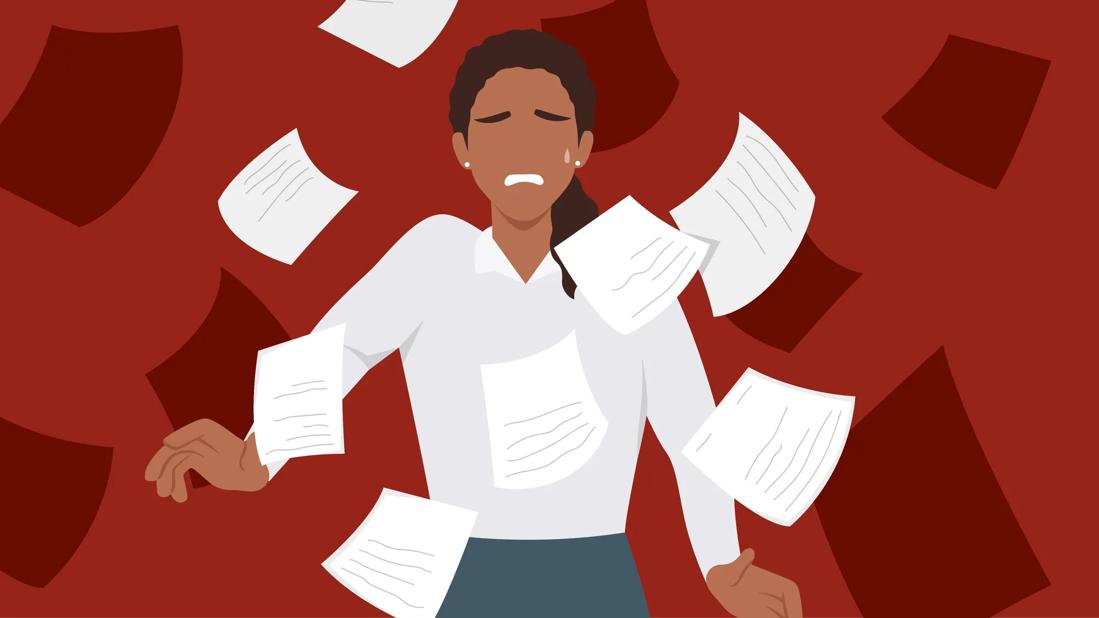Work burnout can leave you exhausted and frustrated at work and beyond, but you can beat it by setting boundaries and surrounding yourself with positivity

Work stress is a common part of life for many of us. In fact, a survey by the American Psychological Association (APA) showed that 79% of workers experienced job-related stress.
Advertisement
Cleveland Clinic is a non-profit academic medical center. Advertising on our site helps support our mission. We do not endorse non-Cleveland Clinic products or services. Policy
And all that stress can take a big toll — on your work performance, sure, but also on your physical health, your mental health and your relationships.
It can be tough to recognize when stress tips the scales to full-blown job burnout. And even harder to know what to do about it.
We talked with psychologist Joseph Rock, PsyD, about the signs of job burnout (also called work burnout) and how to overcome it.
Job burnout is an individual experience. The exact nature of the beast can be different for everyone. But in general, job burnout is a prolonged and negative response to work stress that leaves you physically, mentally and/or emotionally tapped out.
Job burnout goes beyond a mild case of the “Sunday scaries” — it’s a lingering and consuming experience of stress, emptiness, dread and all-around bad vibes that center around your job.
“Burnout” isn’t an official mental health diagnosis. But the World Health Organization (WHO) has classified it as a syndrome resulting from unmanaged workplace stress.
And while it can start as a work-specific experience, job burnout can creep into the rest of your life, too.
“When we’re carrying the burden of our job stress home with us, it can spill over into the rest of our lives — affecting our relationships, our parenting, and our interest in hobbies and activities,” Dr. Rock shares.
Advertisement
Left unchecked, high levels of stress can affect your health as well, and put you on a path to depression.
If tight deadlines, a calendar full of meetings and a never-ending barrage of emails leave you feeling stressed day in and day out, it may be work burnout.
A healthy dose of pressure at work can give you fuel — and even make you better at what you do. Job-related burnout, on the other hand, empties you and kills your motivation.
How do you know the difference between expected work stress and work burnout? Dr. Rock says to look for signs like:
Stress and burnout in general are on the rise. But why it happens can be tough to pinpoint. And chances are, it’s not just one thing that’s causing you to feel detached and overwhelmed by the pressures of your job.
The APA suggests that work burnout can happen for several reasons, like:
The good news is you can take steps to reverse job burnout.
But it isn’t always simple.
Sure, some people may tell you to quit your job. And while that might work, a job change isn’t so easy for many people. Finding and learning a new position can be a real challenge in itself.
And in reality, it might not only be your job that’s leading to burnout.
Your work habits and frame of mind make a difference in how you cope with stress at work. And those may not magically change even with a change of workplace — they can follow you to your next job, too.
Here are some strategies that might help.
Dr. Rock suggests starting with creating boundaries between work and home. Finding ways to manage expectations in your workplace can help keep you from feeling overextended.
“There are a lot of ways to do that, in terms of setting limits for yourself on how many hours you’re going to let yourself work,” he says. “Practice leaving work at work, and not answering work emails or work phone calls when you’re at home.”
That can be easier said than done, of course. Your profession or your work culture may not promote a healthy work-life balance.
Advertisement
But that doesn’t mean you necessarily have to buy into the “all-in-all-the-time” mindset. You may, consciously or not, be putting undue pressure on yourself. And that’s something that you have the power to change.
A support network of coworkers can help to extinguish burnout. But who you lean on (and how) can make a big difference. Because surrounding yourself with more negativity about work can fuel the burnout fire.
That co-worker you like to gripe with over lunch? Probably not your strongest ally in combating work burnout.
Your work bestie who side-chats eye-roll emojis during video calls? Not the uplifting influence you need.
Instead, seek out colleagues who bring some positivity to the workplace. Who can help you find some silver linings. Who don’t allow you to dwell on the day-to-day stressors.
When your day is chock-full of difficult conversations, workplace politics and mindless minutia, you can lose track of what inspired you to embark on your chosen career path. Reminding yourself of the bigger-picture good that you’re doing in your job can help keep job burnout at bay.
“Engaging in tasks that feel meaningless can promote burnout,” Dr. Rock points out. “But if you can see ways in which your work effort is consistent with your commitments and values, your job can start to look more like an opportunity to live these values in a tangible manner.”
Advertisement
For example, people in caregiving professions can notice positive results with their consistent effort to help others. And that can help get you through bad days.
Paying attention to the positive impact of your contributions can help you develop a better outlook on your work.
Your work doesn’t define you. And having interests, hobbies and relationships that have nothing to do with your job can help.
Self-care can mean different things to different people. But purposely engaging in activities and having connections that have nothing to do with your work can make a big difference in your outlook on the job, too.
Try these strategies:
If you find yourself becoming overly negative and cynical at work, or if those feelings are affecting your life outside of work, talking to a mental health professional may help you course-correct.
Advertisement
They can help you work through big questions, like whether it is time for a career change or how to talk with your supervisor about your workload and its effects on your well-being.
Learn more about our editorial process.
Advertisement

Try breaking down tasks into manageable to-do lists and relying on time management techniques

Working beyond your limits can increase illnesses and accidents related to your physical and mental well-being

Help calm the angst that can come with the start of a new work week by adopting a positive mindset, planning an activity and getting some exercise

Taking a stand throughout the day can lower your risk of disease while improving your energy, focus and productivity

A hostile work environment can foster a culture of aggression, doubt and negativity that’s harmful to your health and success

Not having paid sick leave, working night shifts and lacking consistency in schedule or pay can cause serious psychological distress

Schedule breaks, stand and stretch, and rely on alarms, to-do lists and other tools to help keep you focused

Decide what you’re OK sharing, respect others and speak up if you feel uncomfortable

Wearing a scarf, adjusting your outdoor activities and following your asthma treatment plan can help limit breathing problems

Your diet in the weeks, days and hours ahead of your race can power you to the finish line

When someone guilt trips you, they’re using emotionally manipulative behavior to try to get you to act a certain way